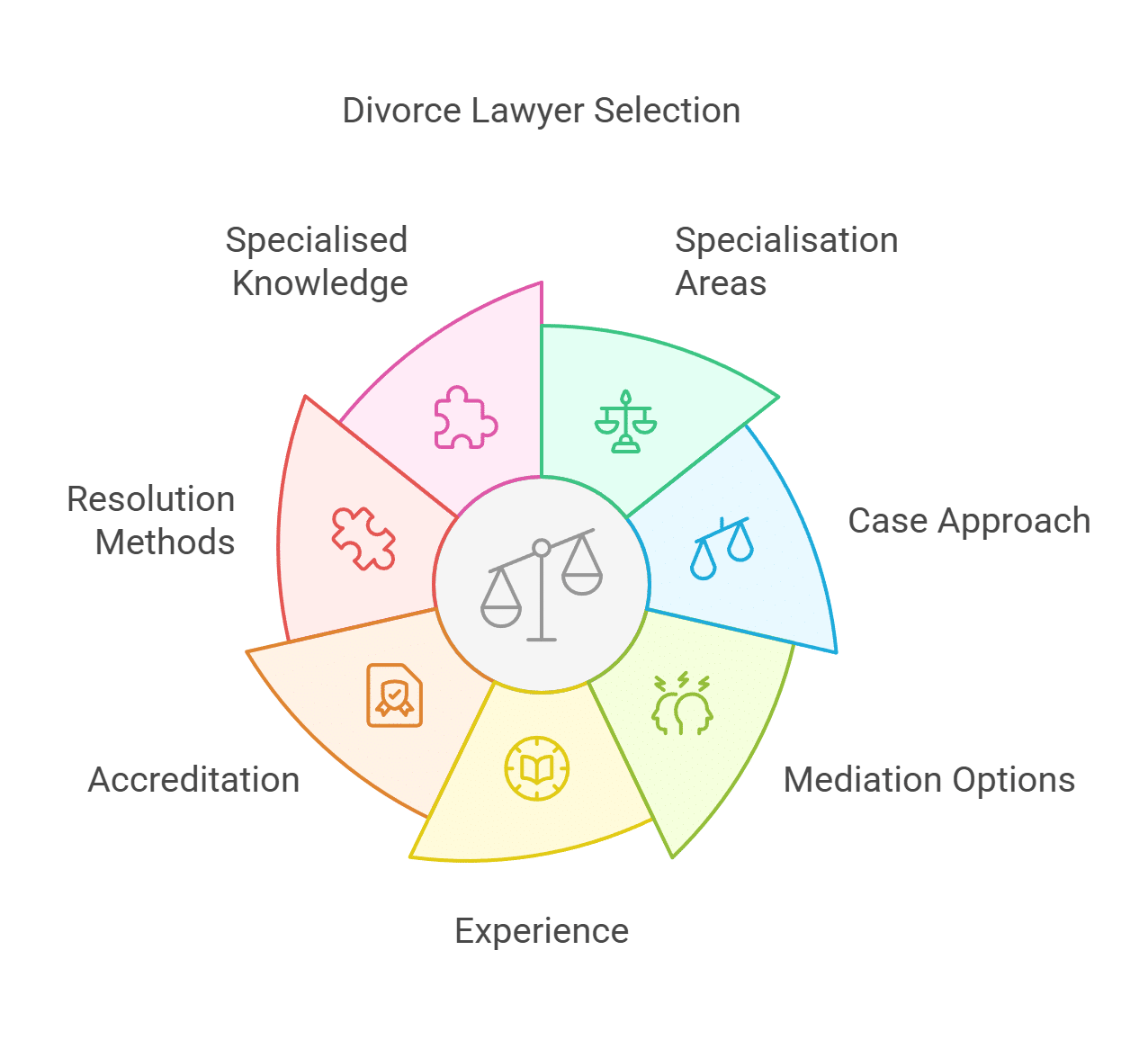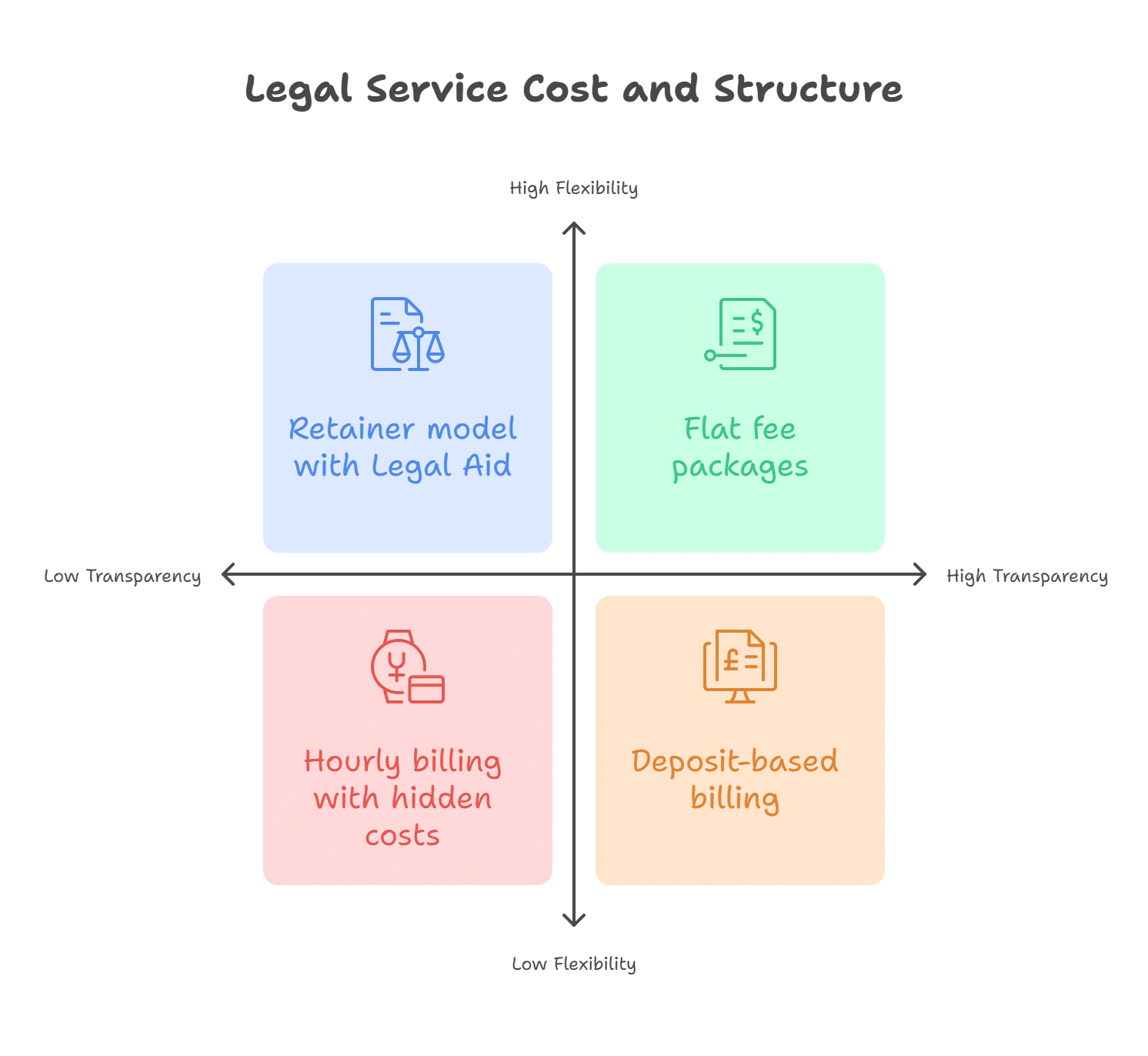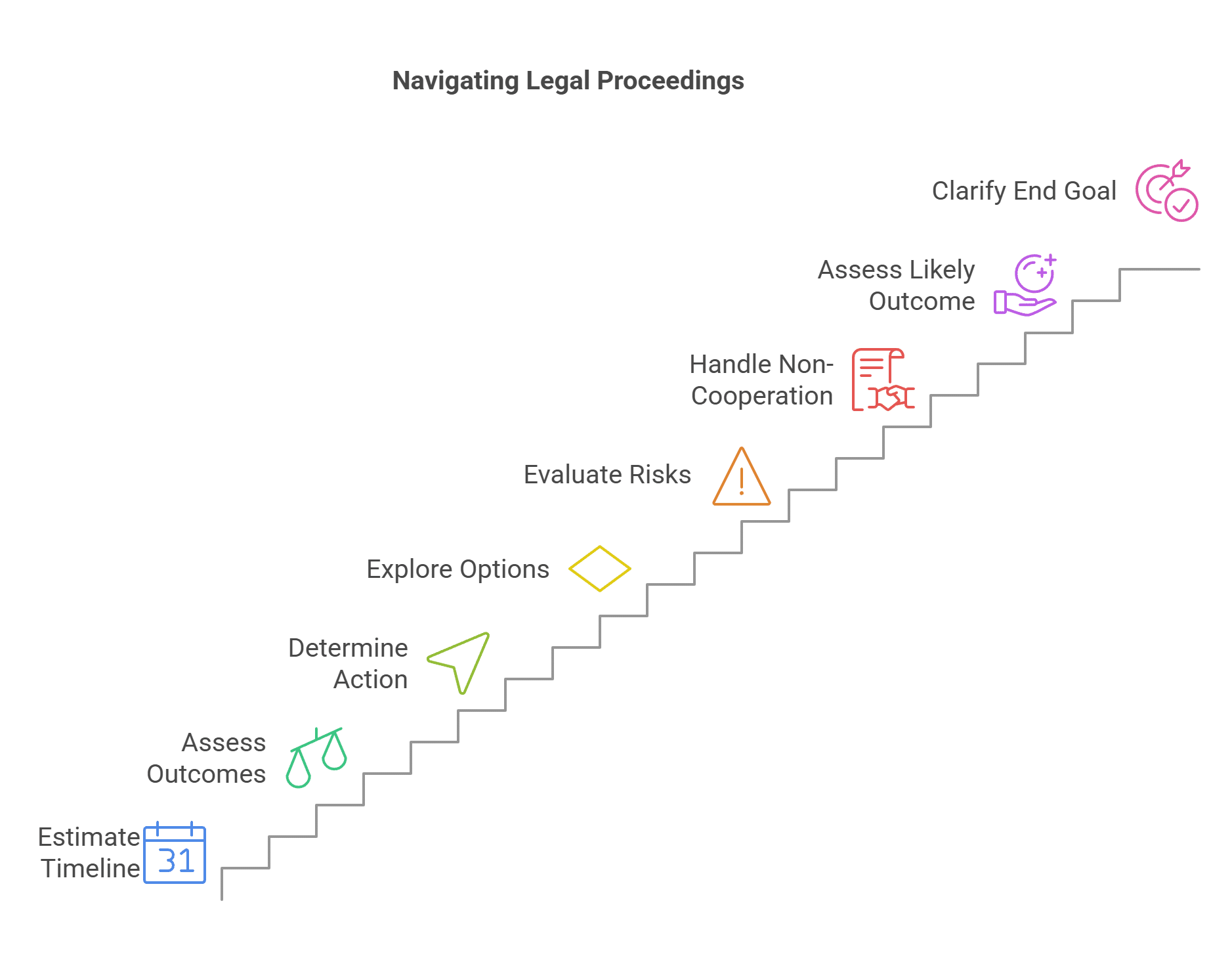Choosing the right family and divorce lawyer to navigate matters involving your children and finances can feel overwhelming. Family law is intricate, and its impact can resonate throughout your life, making it difficult to know where to start. One of the first steps is asking the right questions to ensure you’re making an informed decision.
There are various types of family lawyers with different specialisations – some focus on mediation, while others may refer you to a mediator and act as your legal representative. Lawyers may enlist the assistance of barristers to handle courtroom representation if your case goes to court.
With so much to consider, we’ve compiled a guide to help you ask the right questions before choosing a divorce lawyer.

Choosing the Right Questions to Ask Your Divorce Lawyer Is Based on Your Case Type.
When people first visit a separation or divorce lawyer, they often don’t know where to begin, as the process can vary significantly for different individuals. A common question newly separated people want to know is, ‘How much will getting a divorce cost?’, when what they actually mean is, ‘How much will it cost to legally finalise my separation or marriage?’.
This is because a “divorce lawyer” (a family lawyer) handles all issues related to families and personal relationships, such as marriage dissolution, de facto separation, parenting arrangements, and financial settlements. Their role goes far beyond just divorce paperwork. Getting a divorce is often the easiest part, and de facto couples don’t need to divorce at all.
The majority of a divorce lawyer’s work revolves around:
- Parenting matters
- Financial settlement
These issues can be emotionally charged and costly if parties can’t agree. Delays or complications from either side can extend the process, leading to higher costs. The more complex and contentious the situation, the more time and money it may require to resolve.
Approach & Experience
Different divorce lawyers may approach the legal separation process differently, and it’s worth getting to know them before engaging. Ask questions, read up, look at reviews, experience, and qualifications to understand how they work. You can probably find most of this information on their website, but it’s helpful to ask about anything you can’t find and need to know.

- What areas of family law do you specialise in? The lawyer should explain their expertise in divorce law, child custody, spousal support, property settlements, or other aspects of family law, ensuring they have experience with cases similar to yours.
- What is your approach to handling cases like mine? Learn about their strategy for handling your case. Do they prefer settlement, or are they comfortable with litigation if necessary? A good lawyer should explain their approach and whether they prioritise negotiation or are ready to go to court if needed.
- Is a mediation option possible? Is there an amicable solution to the divorce? Ask if the lawyer encourages mediation or other forms of alternative dispute resolution (ADR) – which is generally required under the Family Law Act in Australia before commencing proceedings. Understanding their approach to amicable solutions can help you decide if a less contentious route is possible.
- How much experience do you have in family law? Ask about their background and how long they’ve been practising family law. Experience is key in handling sensitive divorce cases with varying complexities.
- What is your experience with family law cases like mine? Understanding the lawyer’s experience in handling cases similar to yours—whether it’s high net worth, child custody, or asset division—can give you confidence in their expertise.
- Are you an accredited family law specialist? Asking this question is important because accredited family law specialists have advanced qualifications and specific experience in family-related legal matters beyond general legal practice. Accreditation can show that the lawyer has met rigorous standards and has proven expertise in handling complex family law cases, such as divorce, custody disputes, and asset division.
- How do you typically resolve most family law cases? Find out whether they resolve most cases through negotiation, settlement, or litigation. This will help you align expectations and determine if their methods suit your preferences.
- Do you recommend mediation or other alternative dispute resolution methods? Ask whether the lawyer encourages mediation, collaborative law, or arbitration. Non-litigation approaches can save time, reduce conflict, and result in a more amicable resolution.
- Have you worked with… (any specific parts of your matter that may require specialised knowledge)? If your divorce involves specific details, such as family trusts, domestic violence, business ownership, international law or other complex issues, ask if the lawyer has experience or specific knowledge in those areas. This can make a significant difference in how your case is handled.
Your First Meeting
One of the best ways to have a productive meeting with your lawyer is to be organised and prepared. Come to the initial consultation with all relevant documents, a clear idea of your goals, and a list of questions. Being upfront about your expectations and any concerns will help the lawyer tailor their advice to your situation, ensuring a more effective discussion.
- Will my first consultation be by phone or in person? Check to see whether you’ll need to attend in person, have an online meeting or a phone call.
- How much does the first consultation cost? Our first consultation is typically charged at a fixed rate, which we’ll confirm with you beforehand.
- How long will my first consultation take? Initial consultation may last between one to two hours, depending on the complexity of your situation.
- What do I need to bring to my first appointment? Ask what documents you should bring, such as ID, financial records, and any legal paperwork relevant to your case. It’s also a good idea to share your desired outcomes and ensure you have realistic expectations.
- Will I have a clear plan of action after we talk? Find out if you’ll leave the meeting with a clear roadmap for the next steps in your case. Also, ask if there’s any homework you need to do before the next meeting.
- What is your strategy for minimising emotional stress during the process? Family law cases can be emotionally charged. It’s important to know how your lawyer will support you emotionally while pursuing a resolution or to put a plan into place for support while your matter is finalised.
Legal Costs & The Billing Process
Legal fees can add up, and it’s wise to be clear about expected costs from the outset – although multiple factors can affect the total costs.

- How do you charge for your services? Clarify their fee structure – do they charge by the hour, offer flat fees, or use a retainer model? Ask if there are any additional or hidden costs, such as administrative fees or charges for phone calls and emails.
- What are your fees? Ask for a clear breakdown of the lawyer’s fees, including hourly rates, flat fees, or any other billing structure they use. Understanding the full cost upfront will help you budget for the process.
- Do you offer packages? Some lawyers may offer fixed-price packages for specific services (e.g., divorce applications, Consent Orders). Enquire if this is an option and whether it applies to your case.
- Do you accept Legal Aid or private billing only? If you are considering accessing Legal Aid, it’s important to let any lawyers you may be working with know this. Some will accept Legal Aid for eligible clients, but private billing is generally the standard.
- Do you require a deposit or amounts held in trust? Find out if the lawyer requires an upfront deposit or if funds are held in trust to cover future expenses. Knowing how funds will be managed is essential for financial planning.
- Will I be billed if I need to touch base about something minor? Ask if you’ll be charged for brief check-ins or minor updates, especially if it’s just a quick question or clarification.
- If we talk for a small amount of time, will I be billed pro rata or for the whole hour? Inquire if the lawyer charges by the minute or if you’ll be billed in full-hour increments, even for shorter conversations. This helps you understand how small interactions are handled.
- Will I be charged every time my ex-partner sends you an email or letter? Ask if you’ll be billed for each action, such as receiving a letter from your ex, phone calls, or emails. This will help you manage ongoing costs and avoid surprises.
- What are the costs involved in my case? Legal costs vary depending on complexity, but you should expect attorney’s fees, filing fees, and possibly costs for valuations or other expert services. A lawyer can provide a clearer estimate after an initial consultation.
- What’s the best-case cost scenario? Request an estimate for the lowest possible cost if the case goes smoothly—this includes amicable resolutions, limited conflict, or swift settlements.
- What’s the worst-case cost scenario? Ask for a realistic worst-case cost estimate, considering factors like prolonged disputes, court appearances, or unexpected delays.
- How can I best keep costs down for my matter? Get advice on strategies to minimise legal fees, such as negotiating directly with your ex, gathering documents in advance, or sticking to key issues to avoid unnecessary legal actions. If you have a set budget or financial capacity, ask how they see this working for your matter.
- Do you offer any type of payment plans, delayed payment, or litigation funding? Ask if the lawyer offers payment plans, deferred payments, or access to litigation funding to help spread costs over time. This can be especially helpful if you’re facing financial challenges during the process.
How Your Matter Will Progress & What To Expect
Having a clear idea about the timeline for your matter can provide peace of mind. Ask for a best-case/worst-case scenario, and keep in mind that delays may be out of your lawyer’s hands. Factors like court dates or waiting for your ex-partner to reply can influence the timelines.

- What is the likely timeline for my case? Get an estimate of how long the process might take, including key milestones, potential delays, and how long each stage (e.g., discovery, negotiation, settlement) typically lasts.
- What are the possible outcomes of my case? Ask for realistic outcomes based on your specific situation. It’s important to understand both the best-case scenario and potential risks or negative outcomes, including factors that could influence the final decision.
- What path of action is best for me to take? Ask for a clear strategy based on your situation, whether it’s mediation, negotiation, or litigation.
- If that doesn’t work, what are my options? Enquire about your backup options if your first choice doesn’t resolve the matter, such as escalating to court or using alternative dispute resolution methods.
- What are the risks and benefits of using that plan of action? Request an explanation of the potential risks and benefits of the proposed plan, including time, cost, and emotional impact.
- If my ex is not cooperative, what can I do? Ask for guidance on how to handle a situation where your ex is uncooperative and whether there are legal tools available to encourage cooperation.
- What is the likely outcome in this matter? Request an honest, realistic assessment of the most likely outcome based on the specifics of your case.
- Are there time limits for these matters? Ask about any important deadlines or time constraints that may affect your case, such as filing requirements or response times.
- How will you keep me informed about the progress of my case? Establish how often the lawyer will update you and what communication methods they use, such as phone calls, emails, or client portals. Clear communication is essential for peace of mind during the process.
- What should I expect during the legal process? Ask for a detailed explanation of each step involved in the divorce process. Knowing what to expect can help alleviate anxiety and keep you prepared for the stages ahead.
- Do I have realistic expectations for my matter? Ask the lawyer to assess whether your expectations align with what is realistically achievable based on your case’s specifics. They can help you understand potential outcomes, risks, and any factors that might affect the timeline or result.
- Is it possible to avoid going to court? Many cases can be resolved through mediation, negotiation, or a collaborative divorce process. Making a parenting plan or financial agreement outside of court is often possible, but check with your lawyer about your individual circumstances.
- How long will this all take? Ask for an estimated timeline for your case, including key milestones and potential delays. This will help you manage expectations and plan accordingly. The timeline depends on factors such as the complexity of child custody cases, the need for valuations, or if both parties agree. Mediation may expedite matters, but contested cases in family court could take longer.
- What is the end goal? Clarify what the final outcome should look like – whether it’s a settlement, parenting orders, or some other resolution – and how it aligns with your objectives and the process for obtaining them.
Communication & Contact
- How often will we need to communicate? Ask how frequently the lawyer expects to communicate with you, whether it’s weekly, bi-weekly, or as needed, and the best way to stay in touch.
- Who will keep me updated? Find out who will be responsible for keeping you informed about your case’s progress – whether it’s the lawyer directly or a member of their team.
- Will you handle my matter from start to finish? Clarify if you’ll work with the lawyer directly or if junior lawyers, team members, or other representatives (e.g., for court or mediation) will handle parts of your case.
- If other team members will be involved, who are they? Clarify who will be directly managing your case and whether other professionals in the firm will assist.
What You Will Need To Provide or Obtain & Timelines To Do So
- What can I do to help my case? Ask what steps you can take to strengthen your case, such as gathering key documents, obtaining valuations or following specific recommendations to support your position.
- How do you handle conflicts or disagreements? Enquire about the lawyer’s approach to handling disputes, especially if tensions arise with your spouse or the other party. It’s important to know how they manage conflicts and keep things moving forward.
- What documents do I need to provide, and by when? Ask for a list of specific documents you need to submit, such as financial statements, tax returns, parenting plans or custody agreements, and clarify any deadlines for submitting them.
- How do I get valuations? If needed, ask about how to obtain professional valuations for assets like property, businesses, or investments. Your lawyer may recommend appraisers or experts to help with this process.
- What else is needed to support my financial or parenting matters? Ask if any additional documents or information are needed to strengthen your case, such as proof of income, expenses, or any communication regarding parenting arrangements.
Parenting Matters
Organising parenting matters (formerly referred to as legal custody) properly is important for everyone in the family. Arrangements should be fair and reflect the best interests of the children involved.

- Do you handle cases involving children, parenting matters or child support? Ensure the lawyer has experience with child custody, visitation, and child support matters. Their expertise in these areas is crucial for navigating the complexities of family law involving children.
- Do we need a parenting plan or consent orders, and what’s the difference? A parenting plan is informal and can be written and agreed upon by parents. Consent orders are legally binding and usually need a lawyer to assist with drafting, a court application, and approval. Consent orders provide enforceable terms approved by the court, whereas a parenting plan relies on mutual agreement but isn’t legally enforceable.
- What amount of care would be best for each parent in our situation? Every family is unique, and it’s important to choose a care arrangement that works for you and your children. The needs of children and parents also change over time, so you may need to consider the bigger picture – for instance, if a baby is being breastfed at the time of separation, parenting arrangements could temporarily reflect that until the child is a little older.
- If we make orders now, will they be suitable when the children are older? Enquire if the proposed orders will remain suitable as your children grow and their needs change. A good lawyer will help you anticipate future adjustments to the arrangements.
- Is our matter straightforward or high- conflict with layers of complexity? Ask the lawyer to assess the complexity and potential for conflict in your case. Understanding whether the situation is likely to be straightforward or contentious can help set realistic expectations. If you and your ex-partner agree on most things, legal matters are much easier. If both parents want majority care, if there are allegations of abuse or domestic violence, it’s likely the matter will take longer to resolve.
- What happens if our children only want to live with one parent? Ask about the process if your children express a preference to live with one parent. The lawyer can explain how the court considers children’s wishes in custody matters, depending on their age and maturity.
- What if my co-parent and I can’t agree? Ask for advice on how to handle disagreements with your co-parent. The lawyer can outline your options, such as mediation, court intervention, parenting coordination or other conflict resolution methods.
- What if there is abuse or high conflict? What can I do? If there are concerns about high conflict, ask the lawyer about protective measures, such as applying for restraining orders or other legal interventions to safeguard the children and reduce conflict.
- How can I resolve ongoing conflicts about parenting issues (child custody disputes)? The lawyer can suggest solutions such as mediation, FDR, or court action if necessary. They will help guide you through the process, keeping the child’s best interests in mind.
Financial Matters
One critical aspect of relationship law is how the breakup will impact your financial future, so it’s important to have the support to make informed decisions.
- What is a fair split in our circumstances? A fair split depends on contributions made by both parties (financial and non-financial), future needs, and any family residence or business assets involved. Talk to your lawyer about what this may look like in your situation and how they will ensure an equitable distribution based on your unique circumstances.
- What is the usual percentage split in relationships like ours? There is no standard percentage, but the court will assess contributions, both financial and non-financial, to determine a fair distribution. Length of the relationship and individual needs are also factors.
- What financial agreements are available for us? You may be able to reach an agreement through a binding financial agreement (BFA), consent orders or privately agreed property settlement, depending on your situation. These agreements cover asset division, shared property and superannuation.
- What financial documents and information needs to be disclosed, & what happens if something is withheld? Property settlement can be very complex if there is a large asset pool, family businesses, trusts or complicated financial structures in place. Both parties must fully disclose all relevant financial information. If documents are withheld, it can negatively impact your case and may lead to legal consequences. Ask about the types of documents that need to be prepared, any valuations that may be necessary, and what can be done if the other party is hiding assets.
- How are valuations for property or assets handled in my case? Valuations are often necessary for property, businesses, or investments. You or your ex-partner will need to hire qualified professionals to assess the current value of these assets.
- Can assets be sold or acquired after separation but before property settlement? If you or your former partner sell or acquire assets after your breakup but before property matters are settled, this may impact the property settlement process. It’s important to get legal advice before transferring, selling, acquiring, or gifting any shared assets.
- How will my superannuation and SMSF be divided? Superannuation is generally treated as part of the overall asset pool and can be divided during settlement. You may need superannuation accounts valued. You will need a superannuation splitting order or a specific clause in a BFA if you are transferring superannuation with your former partner.
- Will I be eligible for spousal maintenance, or do I need to pay for it? Spousal maintenance may be applicable if one spouse is unable to support themselves after separation. The lawyer will assess the financial issues to determine if it’s needed and the amount.
- How are trusts or businesses handled in a divorce settlement? Trusts and businesses are often complex and require detailed valuations. The division of these assets depends on ownership structures and the length of the relationship.
- How is intellectual property valued in a de facto separation or divorce? This is an important factor for couples who have valuable IP, and it’s worth working with a lawyer who is knowledgeable in this area.
- Will we need a forensic accountant for this case? If there are concerns about hidden assets or financial discrepancies, a forensic accountant can help uncover undisclosed information and ensure a fair division of assets.
- What if property was bought or sold before or after the relationship? Property purchased before or after the relationship may still be considered part of the asset pool, depending on the timing and how it fits into the overall division of assets.
- What happens if there are loans from family members? Family loans need to be disclosed, and whether they’re treated as debts or gifts depends on the agreement’s terms. Documentation of any loan agreements is important.
- What about spousal maintenance or child support? Spousal maintenance may be applicable if one party cannot support themselves post-separation. Child support is usually arranged separately through a private agreement or the Child Support Agency.
If Your Matter Is Going To Court
If your family law matter has ended up in court, it’s important to understand how this will unfold and how to prepare for the hearing. It’s also worth asking your family lawyer if they will represent you in court or have someone else act on your behalf.

- Will you be representing me in court, or will a barrister be representing me in court? Depending on the case, the lawyer may represent you or hire a barrister to handle court appearances, especially for contested issues. It’s important to clarify this upfront and any additional fees that may be incurred.
- What can I do to prepare for my court date? Organise important documents like financial records, parenting communications and any previous agreements related to your case. Clear communication with your lawyer about the key issues will also help, ensuring you are mentally and emotionally ready for the day.
- What documents should I bring to court? Bring critical documents such as parenting plans, financial statements, filing fee receipts, and any temporary orders or divorce orders. These will help present your case clearly.
- What should I expect when I arrive in court? Expect to go through a process of presenting your case to the judge. You may need to respond to questions or provide supporting evidence. The lawyer will guide you through the negotiation process or any temporary orders, if applicable.
- If I lose in court, what are my options? If the judgment is not in your favour, you can explore appealing the decision, seek alternative dispute resolution, or negotiate a new settlement. Your lawyer will guide you on the next steps based on your unique circumstances.
Complex Divorce Proceedings
- What are the requirements for getting an annulment instead of a divorce? Annulments are typically granted if the marriage is invalid due to factors like fraud, coercion, or incapacity.
- What should I do if I’ve lost important documents related to my divorce? Ask how they can assist you in requesting copies from the relevant agencies or courts or, in some cases, work around missing paperwork.
- What do we do if we were married in another country? Talk to your lawyer about if and how you can obtain a divorce in Australia and what documents you will need to do so.
International Family Law Matters
If you are dealing with a cross-jurisdictional family law matter, having a team that understands Australian family law and the laws of the other country is incredibly helpful. Talk to your divorce lawyer about their experience with matters of this nature.
- How do international factors, like living abroad or dealing with foreign assets, affect my divorce? International elements may complicate jurisdiction or asset division, but we can provide you with guidance.
Do You Have Further Questions You’d Like To Ask A Divorce Lawyer? Get In Touch.
Divorce and separation can be complex, but knowing what to ask a divorce lawyer – and what to expect – can make all the difference in understanding your rights and options. By preparing yourself with the right information, you’ll feel more confident in your decisions and better equipped to move forward. Whether you’re just starting the process or need guidance through a difficult issue, our experienced team is here to help.
Ready To Take The Next Step?
Reach out to our team today for a confidential consultation with an experienced divorce lawyer. We’re here to offer the expert support you need during this challenging time. Let us help you gain clarity and find a path forward by answering your questions and providing the guidance you deserve.





